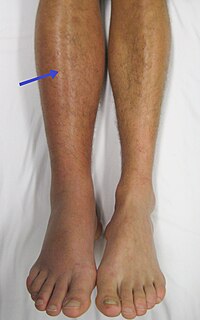
Photo from wikipedia
TOPIC: Critical Care TYPE: Medical Student/Resident Case Reports INTRODUCTION: Since the COVID-19 pandemic, numerous reports have described COVID-19 related coagulopathy, including antiphospholipid syndrome (APL). A relationship between COVID-19 and catastrophic… Click to show full abstract
TOPIC: Critical Care TYPE: Medical Student/Resident Case Reports INTRODUCTION: Since the COVID-19 pandemic, numerous reports have described COVID-19 related coagulopathy, including antiphospholipid syndrome (APL). A relationship between COVID-19 and catastrophic antiphospholipid syndrome (CAPS) has been suggested, but to our knowledge, there have been no case reports strongly describing this association. CASE PRESENTATION: A 57-year-old woman with a past medical history significant for asthma presented to our hospital with severe asthma exacerbation. The patient was intubated and admitted to the intensive care unit (ICU). During her ICU admission, she was found to have COVID-19 pneumonia. On day 16 of hospitalization, she was diagnosed with ST-elevation myocardial infarction. The patient also had encephalopathy and underwent brain magnetic resonance imaging on day 24 which revealed innumerable acute embolic infarcts. On day 27, the patient was diagnosed with an acute deep vein thrombosis in her left lower extremity, but she was not started on anticoagulation due to concern of a lower gastrointestinal bleed. Laboratory workup revealed elevated anti-cardiolipin antibodies (aCL), both IgG and IgM, and elevated lupus anticoagulant. She was diagnosed with CAPS and received 4 sessions of plasmapheresis and was also started on methylprednisolone and intravenous heparin. Our patient had no improvement in mental status with initiation of therapy. On day 39, she underwent repeat head computed tomography scans, which showed right frontal intracerebral hemorrhage. Patient was provided comfort care and died on day 41 of hospitalization. DISCUSSION: CAPS is a severe form of APL. IgG aCL is seen in 81% of patients;IgM aCL was identified in 49% and lupus anticoagulant in 83%. [1, 2]. Triggering factors were identified in 65% of the CAPS flares. The most common triggers were infections, (49% of episodes) and the most common site for infections was pulmonary (33%). Infections included viruses, bacteria and parasites. [1, 2]. Other differentials were considered for our patient, such as thrombotic thrombocytopenic purpura, hemolytic uremic syndrome and disseminated intravascular coagulation, but were less likely given the negative hemolysis workup. Although this patient had no known history of previous positive APL antibodies or histopathological evidence of small vessel occlusion, she was diagnosed with CAPS based on evidence of multiple thrombotic events in 3 different organs within <2 weeks, along with positive aPLs. CONCLUSIONS: This case represents a potential link between COVID-19 and CAPS. We hope to raise awareness of the need for continued workup for hypercoagulable states in patients with COVID-19 and suggest that CAPS should be considered as one possible cause. We also hope to raise concern for the possibility of CAPS in critically ill patients with COVID-19 who show evidence of repeated incidence of thromboses in multiple organs, as this is a potentially treatable condition. REFERENCE #1: Cervera R, Bucciarelli S, Plasín MA, et al. Catastrophic antiphospholipid syndrome (CAPS): descriptive analysis of a series of 280 patients from the "CAPS Registry". J Autoimmun. 2009;32(3-4):240-5. REFERENCE #2: Rodríguez-Pintó I, Moitinho M, et al. Catastrophic antiphospholipid syndrome (CAPS): descriptive analysis of 500 patients from the International CAPS Registry. Autoimmun Rev. 2016;15(12):1120-4. DISCLOSURES: No relevant relationships by ALAA ABU SAYF, source=Web Response No relevant relationships by Yahia Al Turk, source=Web Response No relevant relationships by Julia Bachler, source=Web Response No relevant relationships by Sufiya Hussain, source=Web Response No relevant relationships by Vikash Patel, source=Web Response
Journal Title: Chest
Year Published: 2021
Link to full text (if available)
Share on Social Media: Sign Up to like & get
recommendations!